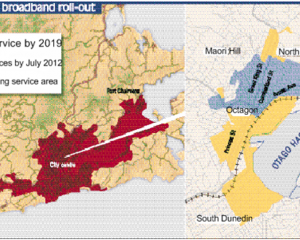
The acknowledgement this week that Australian-based Telstra is in talks with Vodafone over the possible sale of TelstraClear in New Zealand has given rise to all sorts of possibilities for the domestic market.
Telecommunications Association of New Zealand chief executive Paul Brislen says that without a mobile division to call its own, TelstraClear was always going to struggle in New Zealand.
"Either Telstra needs to put up and invest, or it's time to call it a day.
"By the sounds of it, having looked at Vodafone NZ and not wanting to pay the asking price, it would seem a reverse offer is on the table."
Australian telecommunications analyst Paul Budde said there had been as many strategies as there had been chief executive officers of TelstraClear's mother company in Australia.
There had been no clear direction and a hotchpotch of investments and initiatives - no clear longer-term strategy at all, he said.
"Over that period it has been our view that the company was not serious about its investments in New Zealand and one of the scenarios for a solution to that situation would be that Telstra would eventually leave the country - always keeping, of course, a presence for its transtasman business."
One of the options previously mentioned was the possible takeover of Telecom New Zealand by Telstra, he said.
At the start, Telstra's expansion into New Zealand was a defensive move, following Telecom's purchase of AAPT in Australia in 2000.
From then on it became a game of tit-for-tat, with everybody losing.
Telecom was the first one to move out when it sold its AAPT business at a great loss and, in the absence of the need for a defensive strategy to stay in New Zealand, it became only a matter of time before a major decision was going to be made about the future of TelstraClear, Mr Budde said.
"Vodafone NZ is now talking to Telstra about acquiring TelstraClear and rumours have it that this is a prelude for Telstra to take over Telecom."
That raised the possibility of some interesting outcomes, he said.
With the Australian National Broadband Network deal done, Telstra was sitting on a lot of cash and was exploring where it wanted to invest.
If the rumours regarding the takeover of Telecom were not true, Telstra would have taken a look at New Zealand and concluded that TelstraClear and New Zealand did not fit into that picture.
"In that case, after due consideration, plus a review of the opportunities that already existed because it has a foothold in Australia, it seems to have decided against New Zealand and they would have decided for an exit strategy."
On the other side, if the rumours about buying Telecom proved to be correct, Telstra would have to come to the conclusion there were synergies in merging the two operations across the Tasman and that such a merger would lead to significant cost savings in New Zealand - making it, from a telco perspective, just another state of Australia.
That strategy would fit in the global trend where telcos needed to find new ways to progress, Mr Budde said.
"There is no other way to do this than to cut costs and this merger could indeed assist in that."
For Vodafone, in a telecommunications market where there was blurring of the borders between mobile and fixed infrastructure, the company was in need of a better presence in those areas.
It already had made moves in the past and the current negotiations heralded a further step in that direction.
Mr Budde said Vodafone would pick and choose the TelstraClear elements it liked and over time, merge them into the Vodafone business.
Bundling mobile and fixed-line issues would be a key issue.
Vodafone could also lay its hands on more spectrum and some good backbone networks, which would be welcome in the introduction of 4G. In general, Vodafone would be able to extend its customer base in the SME and corporate markets.
"Another interesting conclusion we arrive at here is that this obviously means Vodafone will keep its New Zealand-Australia business.
"The two are closely integrated and it will cost serious money to separate them."
The strategy in Australia seemed to be a slow merger of infrastructure between Vodafone and Optus that could either lead to a different position for Vodafone in the Australian market or to a more gradual withdrawal - depending on how the company performed over the next year or so, Mr Budde said.
Back to New Zealand, Mr Budde said without Telstra taking over Telecom, it was hard not to conclude that the Vodafone purchase of TelstraClear would make Vodafone the long-term dominant player in the New Zealand market. Because of that, any possible deal would come under significant scrutiny.
However, the Government and the Commerce Commission would need to accept that the New Zealand market did have competition limitations and be innovative in planning how to balance the competition issues with the commercial realities.
Some stringent wholesale or resale clauses and sharing of mobile infrastructure with companies such as 2degrees could be attached to the merger.
"This will also have a serious effect on Telecom and it will be most interesting to see if this company can transform itself to match the marketing vigour of a rival like Vodafone."
If Telstra took over Telecom, it would lead to fewer people being employed within Telecom.
That would have some political implications.
It would be interesting if there was also a growth scenario attached to such plans for jobs in New Zealand, Mr Budde said.


